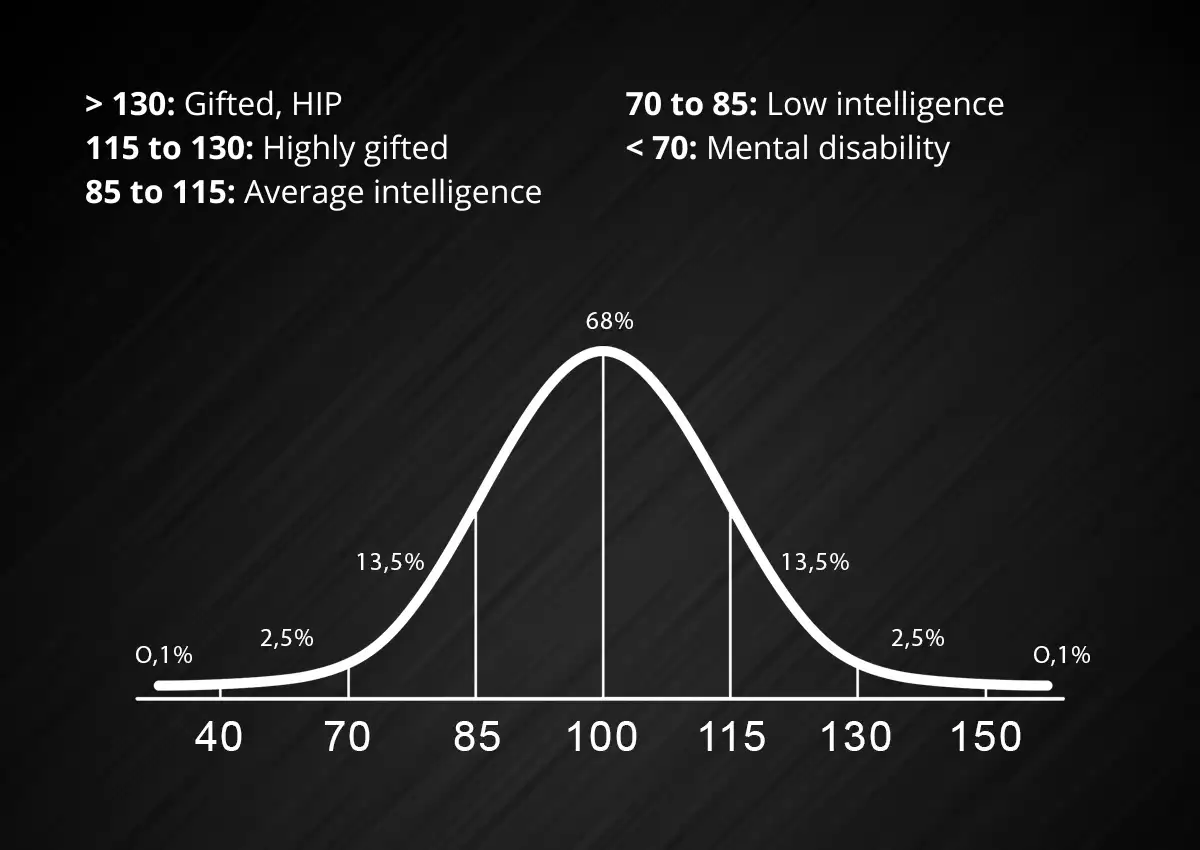Measure your IQ online
- Assess your cognitive abilities
- 20 questions in less than 20 minutes
- Get your official IQ certificate
- Immediate analysis and results

IQ DATA certified test
Measure your intelligence quotient with our IQ tests

Discover your potential IQ
The test consists of 20 questions to assess your skills. We will give you your IQ score and the answers to the questions at the end of the test. All the questions are designed to test your brain.
- Measure your IQ in 20 questions
- Comprehensive test, elaborate questions of increasing complexity.
- IQ DATA certified test
- A database of over 2 million people assessed.
- A quantified indication
- Download a certificate that attests you have passed the test.
Population average IQ
IQ (intelligence quotient) is a measure of an individual’s general intelligence, assessed using standardised tests designed to evaluate various aspects of cognitive ability.
IQ tests are designed to assess areas such as memory, logical reasoning, verbal comprehension, problem solving, information processing speed and mathematical skills, among others. IQ test results are then compared with those of a population of similar age to determine a person’s IQ relative to their age group’s.
The average IQ is generally set at 100, which means that most people have an IQ close to this value. An IQ above 100 is therefore considered above average, while an IQ below 100 is considered below average. People with a very high IQ are often referred to as gifted or with high intellectual potential.



The average IQ in the world is 100
Assess your skills in a fun, stimulating and captivating way. Reveal your genius and measure yourself against the world’s population by taking our IQ DATA certified IQ TEST.
Over 2 Million users have taken the test to date, so take the test, challenge your friends and find out who is the smartest!
Get your personalised performance result and compare your results with thousands of adults from all over the world.
What is an intelligence quotient (IQ)?
An intelligence quotient test, or IQ test for short, is a set of questions and exercises designed to assess a person’s mental abilities in different areas such as logic, reasoning, memory, verbal and mathematical skills and other similar abilities. The main purpose of an IQ test is to measure a person’s general intelligence.
An IQ test usually takes the form of a series of questions that become progressively more difficult. The questions may involve logical patterns, analogies, mathematical calculations, sequence problems, word definitions, and other types of exercises. The answers given by the person are then compared with those of a reference group – usually the general population – to determine how well the person compares with the average in terms of intellectual skills.
An IQ score is calculated based on a person’s performance relative to established norms. The average is usually set at 100, and deviations from this average indicate how far above or below average a person is in terms of intelligence.

Characteristics of people with high intellectual potential (HIP)
and how to detect them
People with high intellectual potential (HIP), also known as gifted individuals, have distinct cognitive and emotional characteristics. These characteristics can vary from person to person.
Psychologists who specialise in assessing people with high intellectual potential recognise that these individuals have distinctive cognitive, emotional and behavioural traits. Here are some of the elements that psychologists take into consideration:
- High intellectual ability: HIP individuals generally have rapid reasoning ability, a strong memory and an ability to make connections between complex concepts.
- Curiosity and broad interest: HIP individuals often show a keen interest in a wide variety of subjects. Their curiosity drives them to explore areas that captivate them in depth.
- Critical thinking: HIP individuals tend to question established ideas and analyse information presented in depth
- Emotional sensitivity: HIP individuals can feel emotions intensely and may be sensitive to environments and social interactions.
- Creativity: The combination of quick thinking and curiosity can lead to creative and original solutions to problems.
- Perfectionism: HIP individuals sometimes have high expectations for themselves and can be prone to perfectionism.
- Sense of justice: HIP individuals often have a strong sense of justice and may care deeply about social problems.

There are several approaches to detecting an individual with HIP
- Psychological assessments: Psychologists often use intelligence quotient (IQ) tests to assess a person’s cognitive abilities. These tests are designed to measure logical reasoning, problem-solving and verbal skills.
- Behavioural assessments: Psychologists can gather information about a person’s behaviour through questionnaires, interviews and observations. They look for signs of emotional intensity, curiosity and other traits associated with HIP.
- Developmental assessment: Psychologists may examine the person’s early development, focusing on indicators such as early language acquisition, special interests and early achievement.
- Clinical interviews: In-depth interviews with the person and those close to them enable psychologists to gain a better understanding of specific cognitive and emotional characteristics and to gather information about the person’s overall functioning.
- Contextual assessment: Psychologists take into account the person’s environment, including school experience, family and social background, to gain a comprehensive view of the person’s needs and challenges.